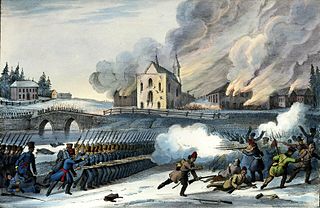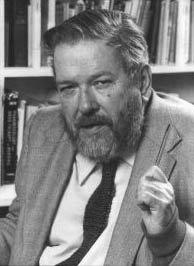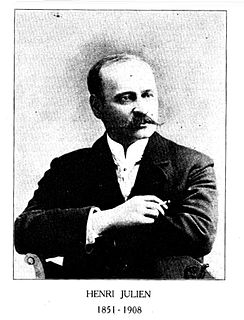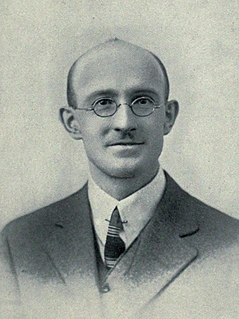
The Rebellions of 1837–1838, were two armed uprisings that took place in Lower and Upper Canada in 1837 and 1838. Both rebellions were motivated by frustrations with political reform. A key shared goal was responsible government, which was eventually achieved in the incidents' aftermath. The rebellions led directly to Lord Durham's Report on the Affairs of British North America and to the Act of Union 1840 which partially reformed the British provinces into a unitary system and eventually led to the British North America Act, 1867 which created the contemporary Canadian federation and its government.

George Parkin Grant was a Canadian philosopher and political commentator. He is best known for his Canadian nationalism, political conservatism, and his views on technology, pacifism, and Christian faith. He is often seen as one of Canada's most original thinkers.
George Ramsay Cook was a Canadian historian and general editor of the Dictionary of Canadian Biography. He was professor of history at the University of Toronto, 1958–1968; York University, 1969–1996; Visiting Professor of Canadian Studies, Harvard University, 1968–69; Visiting Professor, and Yale University, 1978–79 and 1997. Through his championing of so-called "limited identities", Cook contributed to the rise of the New Social History, which uses "class, gender and ethnicity" as its three main categories of analysis. Cook's conception of "limited identities" was famously formulated in an article in the International Journal in 1967, Canada's centenary year, reviewing the state of contemporary scholarship on Canadian nationalism:
After six new books on the great Canadian problem — our lack of unity and identity — are we getting any nearer the source of the problem? Undoubtedly something is achieved: if nothing else one can wonder if the search is worth the effort. Certainly we should continue to try to understand ourselves; an unexamined nation is not worth living in. But it may be that the frame of reference is wrong. Perhaps instead of constantly deploring our lack of identity, we should attempt to understand and explain the regional, ethnic and class identities that we do have. It might just be that it is in these limited identities that "Canadianism" is found, and that except for our over-heated nationalist intellectuals, Canadians find this situation quite satisfactory.

John Wilson Bengough was one of Canada's earliest cartoonists, as well as an editor, publisher, writer, poet, entertainer, and politician. Bengough is best remembered for his political cartoons in Grip, a satirical magazine he published and edited, which he modelled after the British humour magazine Punch. He published some cartoons under the pen name L. Côté.

Henri Julien, baptised Octave-Henri Julien was a French Canadian artist and cartoonist noted for his work for the Canadian Illustrated News and for his political cartoons in the Montreal Daily Star. His pseudonyms include Octavo and Crincrin. He was the first full-time newspaper editorial cartoonist in Canada.

Grip was a Toronto, Ontario design firm that was home to many of Canada's premier designers and painters during the first half of the 20th century.

This is a bibliography of major works on the History of Canada.
Grateful dead is a folktale present in many cultures throughout the world.
Michael Derek Behiels is a Canadian historian who served as a professor and University Research Chair in the Department of History at the University of Ottawa, specializing in twentieth-century Canadian politics. A student of Ramsay Cook, he is a prominent defender of Pierre Trudeau's conception of federalism: no special status for Quebec and maintenance of linguistic minority rights. In 1985, while a faculty member at Acadia University, his published doctoral dissertation Prelude to Quebec's Quiet Revolution was nominated for the Governor General's Award for English-language non-fiction. Thanks to this book's success, he is still considered to be a major authority on the thought of former Le Devoir editor André Laurendeau.
This is a bibliography of major works on the history of Ontario, Canada.
Canadian comics refers to comics and cartooning by citizens of Canada or permanent residents of Canada regardless of residence. Canada has two official languages, and distinct comics cultures have developed in English and French Canada. The English tends to follow American trends, and the French Franco-Belgian ones, with little crossover between the two cultures. Canadian comics run the gamut of comics forms, including editorial cartooning, comic strips, comic books, graphic novels, and webcomics, and are published in newspapers, magazines, books, and online. They have received attention in international comics communities and have received support from the federal and provincial governments, including grants from the Canada Council for the Arts. There are comics publishers throughout the country, as well as large small press, self-publishing, and minicomics communities.

Andrew Scott Irving was a Scottish-born Canadian bookseller and publisher.

William Alexander Foster,, was a Canadian barrister and essayist, best remembered as a co-founder of the Canada First movement and for his contributions to liberal nationalism in Canada.

The historiography of Canada deals with the manner in which historians have depicted, analyzed, and debated the history of Canada. It also covers the popular memory of critical historical events, ideas and leaders, as well as the depiction of those events in museums, monuments, reenactments, pageants and historic sites.

Sam Hunter (1858–1939) was a Canadian cartoonist and writer who worked for four Toronto newspapers. His work displayed his support for the Conservative Party of Canada and criticized Liberals such as Wilfrid Laurier, as well as French Canadians, Catholics, and Americans. Peter Desbarats and Terry Mosher described Hunter as "a great and gentle caricaturist".

William Paul McClure Kennedy, often known by his initials W. P. M., was a Canadian historian and legal scholar.

The Electoral Franchise Act, 1885, was a federal statute that regulated elections in Canada for a brief period in the late 19th century. The act was in force from 1885, when it was passed by John A. Macdonald's Conservative majority; to 1898, when Wilfrid Laurier's Liberals repealed it. The Electoral Franchise Act restricted the vote to propertied men over 21. It excluded women, Indigenous people west of Ontario, and those designated "Chinese" or "Mongolian".

Who Killed Canadian History? is a 1998 book by J. L. Granatstein. The book argues that Canadians lack national unity because of their failure to teach their country's history. Granatstein contends that multiculturalism, social historians and weak history teaching standards are responsible for Canada's lack of a historical narrative. He advocates for a greater emphasis on the study of Canadian history in schools and university history departments, especially political and military history.












